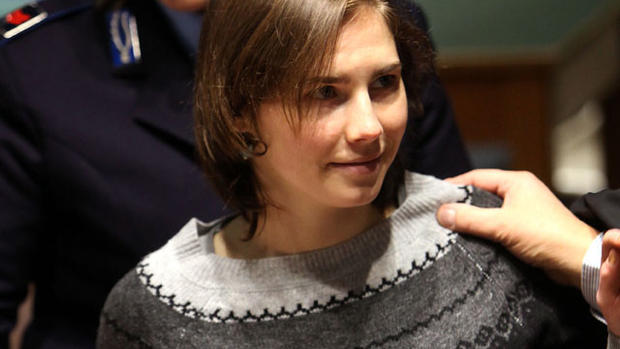Forensic experts in Amanda Knox appeal reject key DNA evidence
(CBS/AP) PERUGIA, Italy - Forensic experts have rejected the reliability of key DNA evidence used to convict Amanda Knox, the American student convicted of killing her British roommate in the Italian city of Perugia.
At Knox's appeal hearing Monday, the two experts presented a report concluding that much of the DNA evidence used in the 24-year-old's trial trial was unreliable and possibly contaminated.
Knox is back in court appealing her conviction in the 2007 murder of her roommate, Meredith Kircher.
DNA evidence played a crucial role in securing the convictions of Amanda Knox and her co-defendant Raffaele Sollecito in the 2007 murder of Meredith Kercher, who was stabbed to death in the apartment she shared with the Seattle exchange student.
CBS News correspondent Elizabeth Palmer reports the defense will try to show the quality of the police work in general has been shoddy, not nearly reliable enough to convict a young woman of murder.
One key piece of evidence under scrutiny is the murder weapon, a knife, on which investigators found Knox's and Kircher's DNA. The independent forensic report argues the sample on the knife was simply too small to be reliable.
Another piece of evidence, Knox's DNA on Kircher's bra strap, is also under question. The prosecution originally argued there was DNA on it, too, from Knox's boyfriend Raffaele Sollecito, which proved he and Knox together were at the murder scene. Not so, says the independent forensic report, which points out that the clasp was left at the crime scene for six weeks and eventually was collected by police using dirty gloves.
The new forensic report, Palmer notes, maintains the Italian police mishandled evidence or failed to follow proper procedure a total of 54 times after the murder investigation began.
Edda Mellas, Amanda Knox's mother, told CBS News: "She's still locked up, and so that's horrible, and it's hard every day in prison, but I think she's feeling more hopeful, like all of us. She feels like she can breathe. That's what she described to us. She feels like the choke-hold is off of her and that there's definitely more hope."
Complete coverage of Amanda Knox on Crimsider

